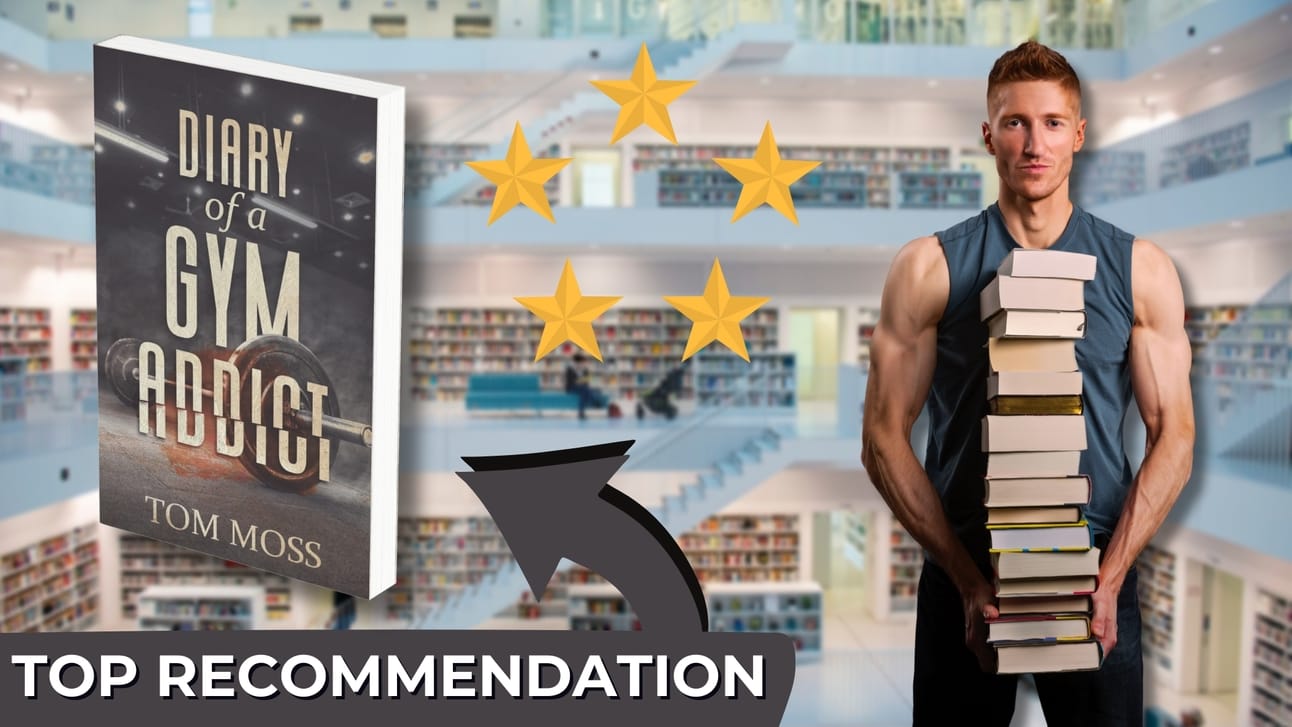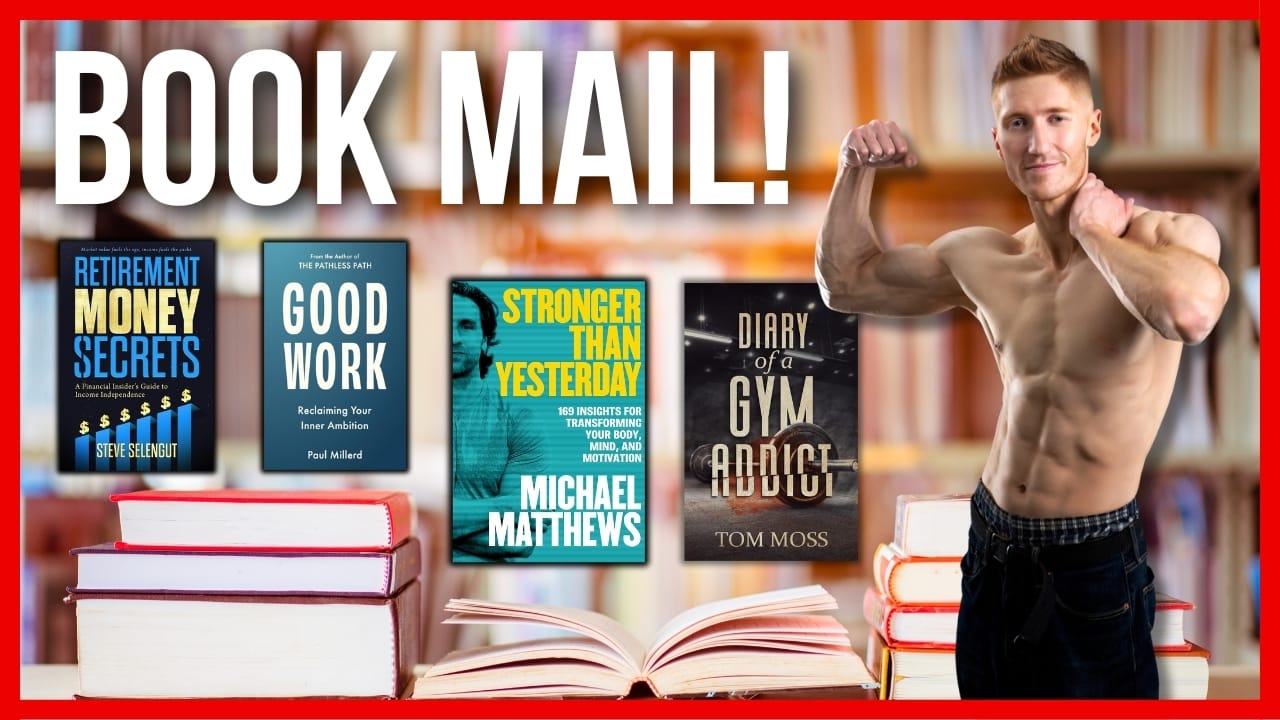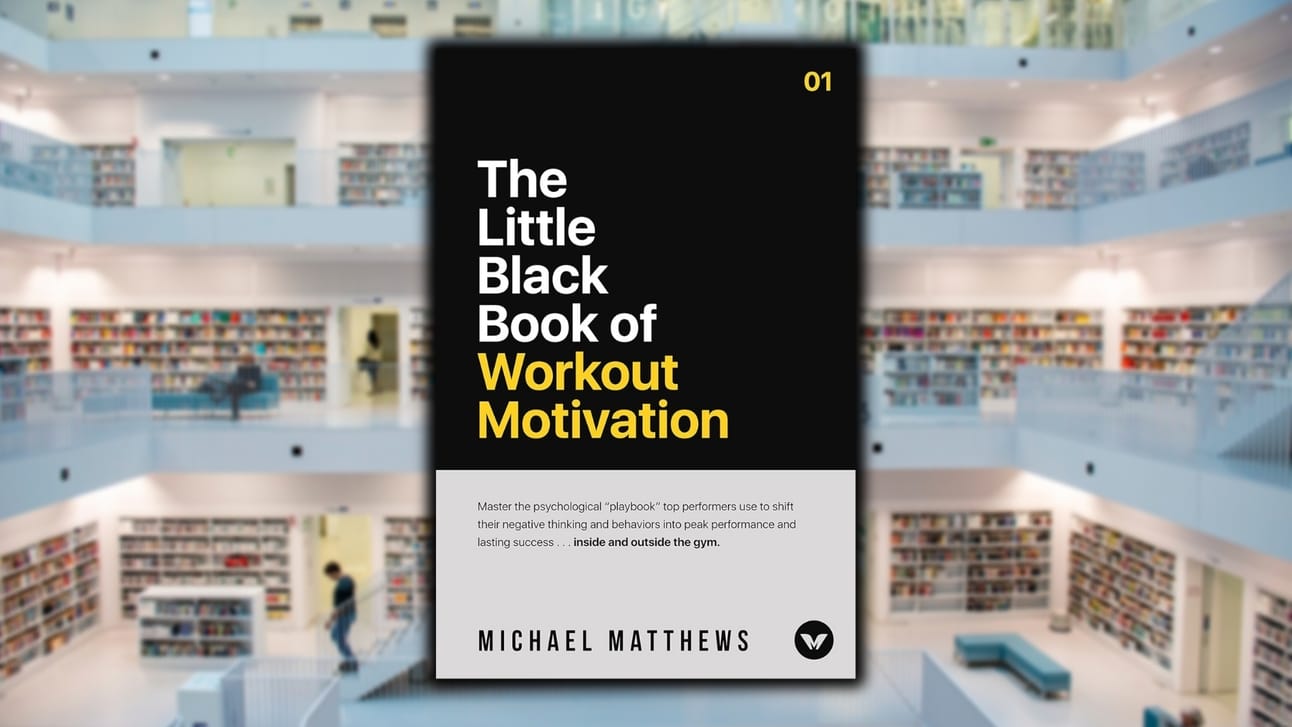This isn’t a lot of money or anything, but I’ve just donated $31 to First Book Canada, $1 for each Premium Member of The Reading Life.
First Book is one of my favorite literacy charities, and they do incredible work!
Donating to them is something I’m going to keep doing every single month, and with the rate this newsletter is growing, I wouldn’t be surprised if we’re able to raise hundreds of dollars every month before too long!
So that’s the good news.
The bad news is that I’m so far behind on my YouTube upload schedule and I’m STILL working on my podcast episode with Steve Selengut, author of Retirement Monet Secrets.
Plus a bunch of other videos that are in production…
I do have one coming out tomorrow, though, about the 7 books I’m most looking forward to reading right now, and that will be going up on YouTube very shortly.
Tonight we’ve got five great books covering several different genres - everything from fitness, science, literature, philosophy, and personal finance.
Each book is wonderful, for different reasons, and below I’ve included full summaries and my complete notes from all of them like I always do here!
So if you’re ready…
In This Issue of The Reading Life, We’ve Got:
📖 What I’m Currently Reading
📜 The Book Quote of the Day
🎥 People Keep Sending Me Books!!
✍ My Latest Medium Articles
✅ New Book Releases Coming Soon
📚 Tonight’s Five Main Book Recommendations
🏅 Earn Rewards for Referring This Newsletter
There’s a lot to get to, so let’s hit the books!
Diary of a Gym Addict, by Tom Moss: Tom’s a natural bodybuilder (meaning no performance-enhancing drugs), and his book is one of the most sensible, straightforward books about successful training that I’ve ever seen or read. The fitness industry is a minefield of misinformation, and that’s why when you finally come across someone like Tom, you’ve gotta read his book and never forget what he taught you.
Feel-Good Productivity, by Ali Abdaal: I ran into somebody the other day who didn’t know who Ali Abdaal was. Wild! Anyway, he’s the world’s most-followed productivity expert, and his book is about increasing productivity by cultivating joy. It’s great so far!
Stronger Than Yesterday, by Michael Matthews: Matthews is one of my favorite fitness writers, and at this point I’ll buy and read anything he puts out. This is his newest book, featuring 169 insights for transforming your body, mind, and motivation.
“Give to charity, but never give in business. Place the highest possible value on your expertise and confidently present that value to the world. When they show up, charge ‘em. The meek and the humble may be very talented and capable but will all too often be overlooked or undervalued. Arrogance and self-promotion are necessary to advance in just about any business environment.”
People Keep Sending Me Books and I Don’t Know Where to Put Them All: Ever have a problem that you wish would never go away? Well I have one!
People won't stop sending me new BOOKS!!
Seriously, between the books I buy myself, the ones sent to me by authors and publishers, and the ones I receive as gifts (not to mention the library books I can't stop borrowing)...my house is PACKED full of great books.
I talk about 6 of them here in this video, plus a few related books you may want to check out as well. [Watch Time: 13:19]
If you got value out of this short video, please consider subscribing to my channel and sharing it with a friend. Cheers!
Book Review: Zero Resistance Selling: The brilliant surgeon and author of “Psycho-Cybernetics” returns to help millions of salespeople get out of their own way.
You’re Leaving Money on the Table by Writing on Medium Without Having a Newsletter to Back It Up: A realistic, math-supported plan for getting to $1k/month with a profit-generating “welcome sequence.”
How You Choose Your Enemies is More Important Than How You Choose Your Friends: The top 11 takeaways from Choose Your Enemies Wisely, by legendary businessman Patrick Bet-David.
The 5 Types of Wealth, by Sahil Bloom: This is one of my most-anticipated reads, and it’s about the 5 types of wealth: Time Wealth, Social Wealth, Mental Wealth, Physical Wealth, and Financial Wealth. Expected: Feb 4, 2025
The Obvious Choice, by Jonathan Goodman: Jonathan’s one of the world's leading experts on helping people simplify their business, and this book offers 15 essential lessons on profit and success that are timeless because they prioritize the humans who buy from you and not erratic and temperamental algorithms. Expected: January 14, 2025
What’s Your Dream?, by Simon Squibb: Simon started his first business while homeless at 16. He later sold it for more money than he’ll ever need, then built up a massive social media audience by giving free help to aspiring entrepreneurs and asking them, “What’s your dream?” Expected: Jan 16, 2025
Below are my complete notes, summaries, and breakdowns of my five main recommendations for tonight! They are…
I don’t want to keep you here all day (I’ve got reading to do), so let’s get right into it!
“Something roughly akin to love is needed for proper biological development, and its absence is among the most aching, distorting stressors that we can suffer."
Stressed out but you have a sense of humor? Why Zebras Don’t Get Ulcers might be the place for you to start. It can be a little heavy on the science, so it’s a little dense at times, but Sapolsky doesn’t let you drown in it.
The guy is a professor of biology, professor of neurology and neurological sciences, and - by courtesy, neurosurgery(!), at Stanford University. He’s also a research associate at the National Museums of Kenya, where he’s spent decades in the field studying primates in the wild, but again, the book is more accessible than the foregoing would have you believe.
The main message of his book is that the human stress response evolved to deal with immediate, short-term dangers, not long-term, chronic ones. We’re talking “run away from the lion and then calm down,” -type stuff, not the “always behind deadline, credit cards piling up, kid getting in trouble at school, global economy collapsing” type chronic stress that many people today experience.
The highly effective stress response we developed via evolution never gets shut off, so it’s running all the time, wearing us down and leading us down the causal pathway to all these preventable diseases. Stress is literally killing us, when it used to be saving us. So how do we take back control?
Exercise is a big factor, same goes for experiencing love and affection (close relationships with other humans, not screens), and achieving greater autonomy. More control over your life and circumstances is basically what you’re looking for here..
What you should know going into this book though is that many times, we have to sort of “save our own life.” The modern world isn’t going to make it easy on us; we’re going to have to take control of our lives and take active measures to control our stress levels before the stress literally kills us.
Maybe you don’t want to move to Africa and live with the silverback gorillas like Dr. Sapolsky here, but if you take the advice in this book, combined with, say, a meditation practice and a little bit of study of Stoicism, you’ll be well on your way.
“Heaven is under our feet as well as over our heads.”
For some reason, I still remember that this was the 133rd book that I had ever read since I started counting. No idea why I remember that. Maybe it’s because Walden was one of the first books to hit me so hard and so fast that it shook me alive as I was reading it and forever after.
Published in 1854, it's the nonfiction account of the time when American transcendentalist author Henry David Thoreau built his own cabin in the woods at Walden Pond and lived there by himself for two years.
It’s about the calming, reorienting power of solitude, about the transformative power of great books, and it’s about how to leave society once in a while so that you can be better prepared to return to it.
We often get caught up in our cares, concerns, and Twitter feeds, and all these demands on our attention tend to crowd out that inner voice we all need to listen to once in a while if we are ever to understand our own lives or what we want them to be about.
I doubt there are too many people in North America today that would be able to live by themselves in the woods for two years, but I’m sure that most of them would be better for the experience.
There are some truly profound and memorable observations scattered throughout these pages, and like I said, this book just completely took me over when I first read it in 2015. You don’t have to move to the woods like Thoreau did in order to become a real person and reconnect with your authentic voice, but it sure as hell helps.
“No one can conceive the variety of feelings which bore me onwards, like a hurricane, in the first enthusiasm of success. Life and death appeared to me ideal bounds, which I should first break through, and pour a torrent of light into our dark world.
A new species would bless me as its creator and source; many happy and excellent natures would owe their being to me. No father could claim the gratitude of his child so completely as I should deserve theirs.
Pursuing these reflections, I thought, that if I could bestow animation upon lifeless matter, I might in process of time (although I now found it impossible) renew life where death had apparently devoted the body to corruption. These thoughts supported my spirits, while I pursued my undertaking with unremitting ardor.”
This 19th-century horror story is astonishing in so many ways, not least because of the intricate story structure and because Mary Shelley was just 18 years old when she wrote it.
It’s beautifully written, spectacularly so, and she possesses Milton’s talent (as seen in Paradise Lost) for making us empathize with the “monster” and feel his psychological pain as our own.
Fun fact: the doctor who creates the monster is named Frankenstein, not the actual monster, who goes unnamed throughout the novel (some people say the monster’s name is Adam, but that’s a long story).
But basically Victor Frankenstein gets it into his head that he’s going to create a sentient being of his own, and over month and months of painstaking work and trial and error he comes up with something…else.
The monster he creates is so hideous that he is ostracized and essentially unwelcome wherever he goes, despite the fact that he isn’t evil (at first) and really just wants to make friends and join a society of equals.
His looks, and the prejudices of the people he comes across makes this impossible, leading him to terrorize doctor Frankenstein, murder several innocent people, and then escape across the frozen landscape of northern Europe, where the doctor ends up giving chase.
The novel itself is split into several different points of view, including the doctor, the monster, and a ship captain, Robert Walton.
It starts off with Walton telling his story in the form of letters to his sister; then he meets a dying doctor Frankenstein, whose narrative then gives way to the creature’s itself, then back to Frankenstein, then back to Walton – it’s really spectacular how it all comes together.
Oh, and the monster is more literate than I am; it’s crazy.
“Stop thinking about what your money can buy. Start thinking about what your money can earn. And then think about what the money it earns can earn.”
This is one of the better investing books out there (out of approximately eight hundred trillion of them ), and it comes with a very easy-to-follow plan for building wealth over time: Spend less than you earn. Invest the surplus. Avoid debt. And that’s pretty much it.
Super simple and effective, but how many people try to overcomplicate everything?
Collins is a personal finance blogger who has built up an exceptionally loyal audience over the years, and he just comes across as a relatively “normal” guy – someone who would invite you over for a barbecue and you’d be excited about going – who actually cares about people, wants them to be provided for financially, and to receive the best information on how best to actually do that.
The book itself goes a bit deeper into his personal philosophy as well, which is fundamentally about freedom. It’s also astonishing to me how many people think freedom is so much further away than it actually is.
Of course, freedom is far away if you choose to remain financially illiterate and don’t take time to learn how the stock market works, what the difference is between an index fund and a mutual fund, what an IRA is, and all this basic financial literacy stuff that he covers in this book. It’s a good refresher course, even for people like me who knew much of this stuff going in. It never hurts to stay up to date and renew your knowledge.
You really can’t go wrong with this one, and it’s full of awesome advice that I’d feel comfortable giving myself: take the initiative and learn about how money works; prioritize putting some money away into investment vehicles that are going to take you to financial freedom over the long term; don’t buy silly stupid shit that you won’t care about next month, when instead you could invest that money and buy your freedom for a lifetime. You know, that kinda stuff!
“What we’ve done or failed to do doesn’t forever determine who we are or will be. In fact, I believe that we have no idea what we can really do. We may never find out, either – there may always be another level – but striving to reach the top is the most rewarding adventure life has to offer.”
I haven't been this impressed with a fitness book in a long time, and as someone who knows a thing or two about a thing or two when it comes to fitness, it is my pleasure to introduce you to this one. I really think that reading it could be the start (or continuation) of something great for you.
This is a thinking man's (and woman's) fitness book, and somehow...somehow...Mike Matthews finds a way to bring Epictetus, Solzhenitsyn, Teddy Roosevelt, Socrates, and more into a book about health and fitness and still make it accessible, easy to get into, valuable, and fun.
And fitness should be fun. It should make your life better, and not be seen as a chore, a fearful obligation, or something that's beyond your reach.
Mike and I also share the conviction that training isn't just about training. People think, "Oh, yea that's just the gym." But the gym is...Life!
And once you learn that you control what happens to your muscles inside the gym, you find out that there's a lot more that you can control outside the gym too.
Forward this to a friend you think would love this book!
If you were sent this newsletter, click here to subscribe.
To read past editions of The Reading Life, click here.
Click here to recommend The Reading Life on Twitter (X).
OK, that’s it for now…
More excellent book recommendations coming your way soon!
And if you’d like me to buy you a new book every month, (and rapidly scale your personal brand while earning more money in your business), click to join us inside The Competitive Advantage - we’d love to have you!
With that said, I hope you enjoyed this edition of The Reading Life, and enjoy the rest of your week!
Until next time…happy reading!
All the best,
Matt Karamazov
P.S. Whenever you're ready, here are three more ways I can help you:
Work with me personally to scale your business past $5K per month and experience the intoxicating freedom of finally being in control of both your time and your income. High-performers only.
Become a Premium Member of The Reading Life and enjoy unlimited access to 150+ Premium Book Breakdowns, my complete notes from 1,300+ books, exclusive discounts, monthly donations made on your behalf to an incredible literacy charity, and more!
Join The Competitive Advantage, my private business mastermind for creators looking to add at least $1,000/month to their revenue and save at least 20+ hours of productive time each and every week.


























